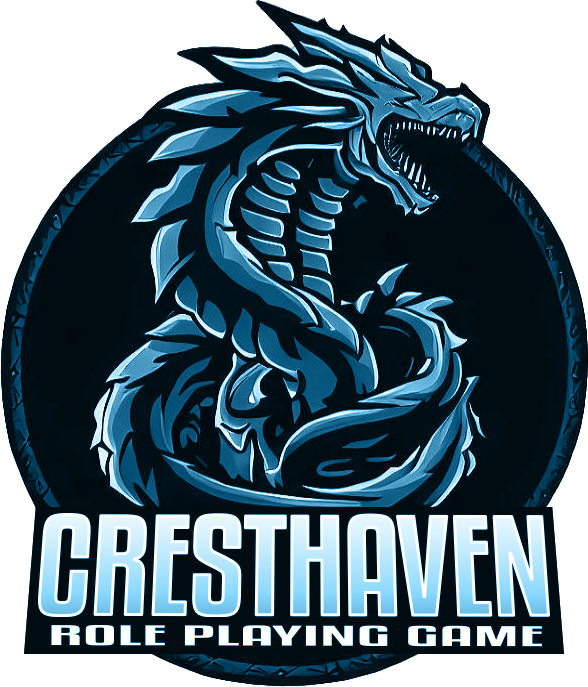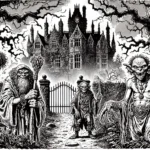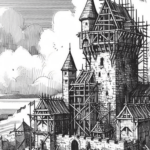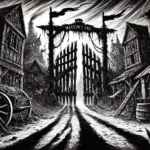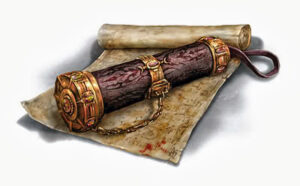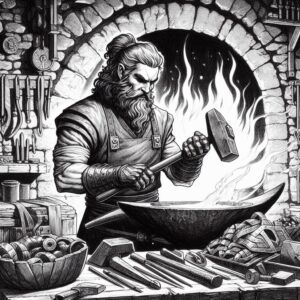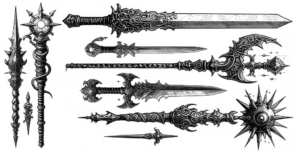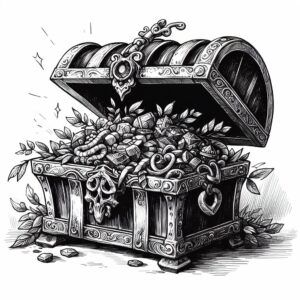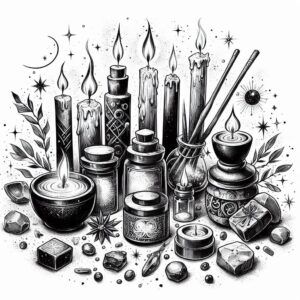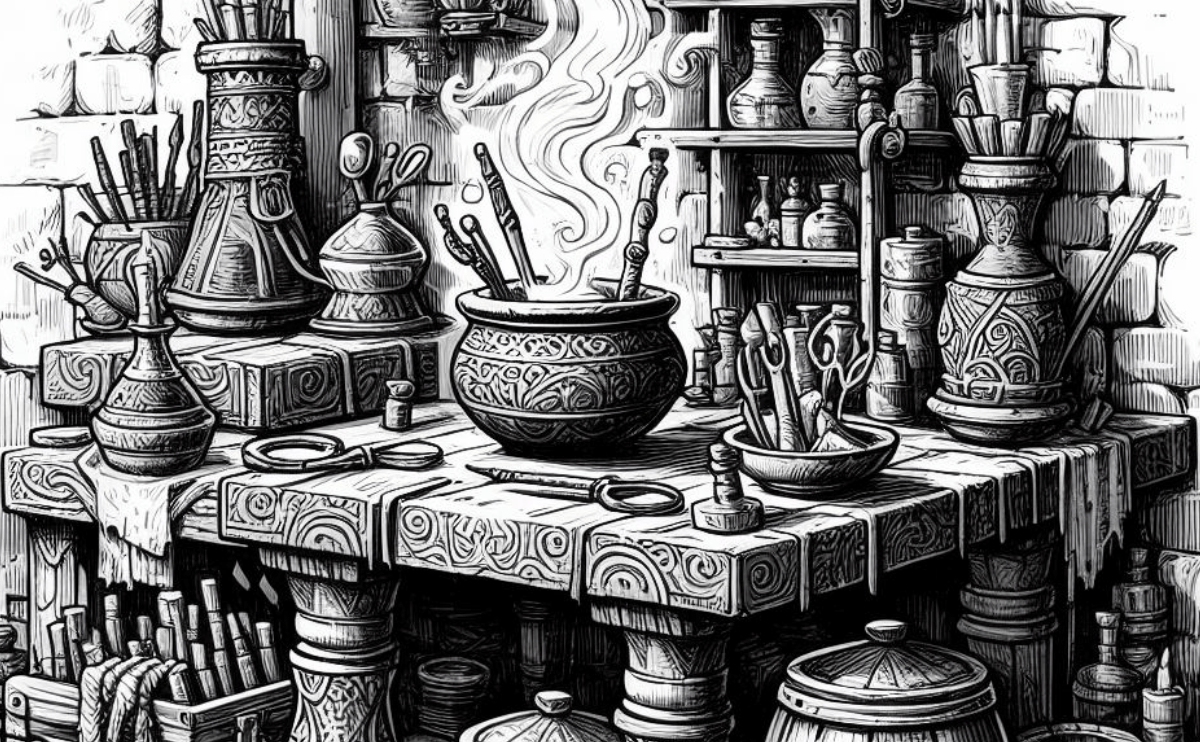
Crafting allows characters to create non-magical and, at higher levels, magical items. This section details the process for crafting both mundane and magical objects, as well as the costs associated with hiring an artisan to craft them for you.
The activities described in this section (crafting potions, poisons, mundane items) can also be undertaken during downtime between adventures. This allows characters to focus their efforts on crafting without interrupting the flow of the narrative. During downtime, the crafting process is assumed to happen “off-camera.” The player simply informs the GM of what they wish to craft, and at the GMs discretion, characters deduct the appropriate costs (time and materials) from the character’s resources. This can be a good option for players who want to acquire specific items but don’t have the time or opportunity to roleplay the crafting process itself.
Crafting Mundane Items
- Tools and Materials: To craft an item, a character must have the appropriate tools associated with the task (e.g., carpenter’s tools for building furniture, smith’s tools for crafting weapons). They also need access to the necessary raw materials.
- Crafting Time: Crafting takes time. A character can either:
- Create a Simple Item: Craft a basic, everyday item worth 5 gp in 1 day.
- Contribute to a More Expensive Item: Work on a more expensive item, putting 5 gp worth of effort into its creation per day.
Example: A character with smith’s tools wants to craft a suit of plate armor (cost: 1,500 gp). Crafting 5 gp worth of progress each day, it would take 300 days (1,500 gp / 5 gp/day) to complete the armor on their own.
Hiring an Artisan:
Characters can also hire skilled artisans to craft items for them. The cost is typically double the base crafting cost (10 gp per day for a simple item, 10 gp per 5 gp of progress on a more expensive item). This includes the artisan’s labor and their access to the necessary tools and a workplace. However, the character does not need to spend their own time on the crafting process.
Creating Scrolls
Scribing scrolls allows characters to create magical items that contain spells. However, this is a complex and time-consuming process, restricted to spellcasters who meet specific requirements.
- Spellcasting Ability: The character must be able to cast the spell they wish to inscribe on the scroll.
- Spell Knowledge: The character must have the chosen spell scribed in their spellbook (wizards) or prepared list (clerics).
Materials and Costs:
- Scroll Parchment: A high-quality, specially treated parchment is required to withstand the magical energies inscribed upon it. The cost of this parchment varies depending on its rarity and quality.
- Inks and Powders: Special inks and powdered magical components are needed to properly scribe the spell formula. The cost of these materials varies depending on the spell’s level and complexity.
Crafting Time:
The time required to scribe a scroll depends on the level of the spell being inscribed. Generally, it takes one day per spell level to complete the scroll. For example, scribing a 3rd-level spell would take 3 days.
Success Rate:
There is a chance of failure when attempting to scribe a scroll. The GM determines the success rate based on the character’s level, their skill in spellcasting, the quality of their materials, and the complexity of the spell being scribed. On a failure, the materials are lost, and the character must start the scribing process anew.
Important Note:
Creating scrolls is a powerful ability that allows spellcasters to expand their magical arsenal beyond their prepared spells. The GM should carefully consider the availability of scribing materials and the risks involved to ensure balanced gameplay.
Crafting Magical Items
Creating magical items is a complex and perilous undertaking, restricted to high-level characters.
- Class Restrictions: Only Wizards and Clerics can craft magical items, typically starting at 11th level. (The GM can adjust this level requirement based on the campaign setting).
- DM Approval: The GM has final say on whether a character can attempt to craft a specific magical item, considering factors like the item’s rarity and potential for disrupting the game’s balance.
Wizard Crafting:
- High-Level Spells: Requires access to spells like “Enchant an Item” and “Permanency.”
- Research and Resources: Finding the necessary ingredients, rituals, and procedures for crafting a magical item requires significant research and potentially rare materials. The GM may require the character to complete quests, consult with sages, or acquire special texts to uncover this information.
- Success Rate: Crafting a magic item involves a risk of failure. The GM determines the success rate based on the character’s level, the complexity of the item, and the quality of their research and materials.
Cleric Crafting:
- Divine Intervention: Clerics create magic items through prayer and devotion. With the GM’s approval, the cleric undergoes a lengthy ritual involving meditation, purification, and supplication to their deity.
- Success Rate: The success of the ritual depends on the character’s piety, the complexity of the item, and the likelihood their deity would grant such a request. The GM determines the chance of success, which can increase with persistent prayer and offerings.
Alchemy – Potions & Poisons
Brewing Potions and Crafting Poisons:
From the restorative properties of healing elixirs to the debilitating touch of toxins, alchemy offers a potent means to enhance your adventuring capabilities. However, mastering this art requires dedication, knowledge, and a touch of fortune.
Requirements:
- Level Requirement: Characters must be at least 4th level to attempt crafting potions or poisons.
- Herbalism Kit: Having a herbalism kit grants a bonus to ability checks made during the brewing process (as determined by the GM).
Crafting Costs:
- Base Cost: Every potion or poison has a base crafting cost in gold pieces (gp) determined by its spell level equivalent (e.g., a Healing Potion is equivalent to a 2nd level spell).
- Base Cost (gp) = Spell Level x 25 gp
- Specialty Ingredients: In addition to the base cost, acquiring rare herbs, venom sacs, or other exotic components is necessary. These ingredients can range from 10 gp to several hundred gp depending on the rarity and potency of the potion or poison.
Time Investment:
Finding these rare ingredients can be a time-consuming endeavor. Characters can spend weeks searching the wilderness or negotiate with specialist merchants and supply houses to procure them. The GM determines the availability and acquisition time based on the campaign setting and the rarity of the ingredients.
The Brewing Process:
Crafting a potion or poison involves careful procedures, precise measurements, and a hint of magical manipulation.
- Intelligence Check: The character makes an Intelligence check to represent their understanding of alchemy and the intricacies of the recipe. The DC of this check varies based on the complexity of the potion or poison, typically ranging from 12 for a common potion to 20 or higher for a rare or powerful concoction.
- Critical Failure: A natural 1 on the Intelligence check results in a critical failure. The GM determines the specific consequence, which could involve an explosion damaging the character and their surroundings, the creation of a useless or even harmful substance, or the ingredients being completely wasted.
Critical Failure Chart (optional)
| Roll | Result |
|---|---|
| 1-2 | Fizzle: The concoction fails to produce any magical effect. Ingredients are wasted. |
| 3-4 | Minor Mishap: The potion or poison has a minor unintended effect. (GM determines the effect, such as causing nausea, emitting a foul odor, or glowing faintly.) |
| 5-6 | Potency Fluctuation: The potion or poison’s potency is significantly weaker or stronger than intended. (GM determines the degree of fluctuation.) |
| 7-8 | Wrong Effect: The concoction produces a completely different effect than intended. (GM creates a new effect based on the base ingredients.) |
| 9-10 | Explosive Misfire: The vial explodes, dealing 1d4 fire damage to the character and any creature within 5 feet. The potion or poison is destroyed. |
| 11-12 | Contamination: The potion or poison becomes contaminated and unusable. Worse yet, it becomes mildly poisonous, inflicting the drinker with the “Poisoned” condition for 1 hour. |
| 13-14 | Backfire: The magical energies backfire, inflicting the intended effect of the potion or poison on the brewer for half its normal duration. |
| 15-16 | Cursed Concoction: The potion or poison becomes cursed. The GM determines the specific curse, which might range from a minor inconvenience to a debilitating affliction. |
| 17-20 | Volatile Mixture: The potion or poison becomes extremely unstable. If not disposed of safely within 1 hour, it explodes, dealing 3d6 fire damage in a 10-foot radius. |
Testing the Concoction:
Due to the inherent uncertainties of the brewing process, the final product’s exact effects are not always guaranteed. To verify its functionality, the concoction must be tested on a willing creature (usually a small animal or a party member brave enough to volunteer). The GM determines the outcome of this test, which could confirm the intended effect, reveal minor variations in potency or duration, or in rare cases, produce unforeseen consequences.
Important Note:
Alchemy is a powerful tool, but it comes with inherent risks. The GM should carefully consider the availability of ingredients, the challenges of the brewing process, and the potential consequences of testing and using these concoctions to maintain balanced gameplay.
Discover more from Cresthaven RPG
Subscribe to get the latest posts sent to your email.
